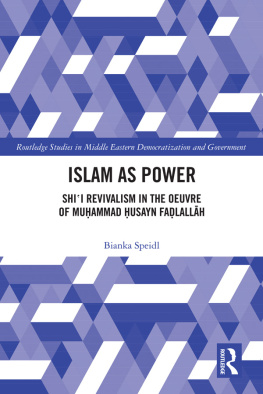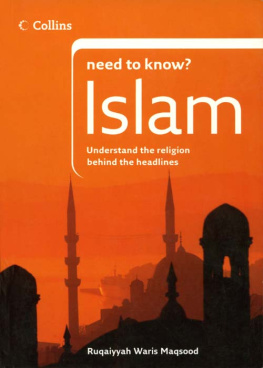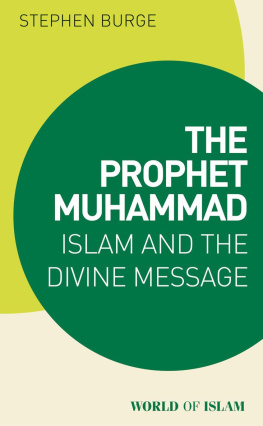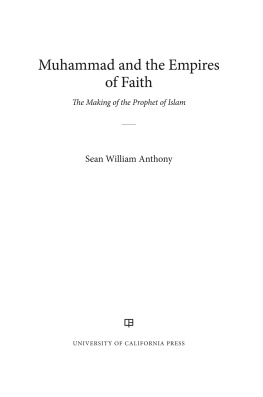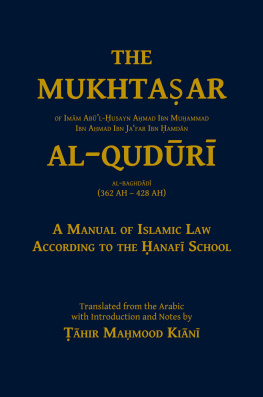Islam as Power
Providing an in-depth and extensive analysis of the concept of power as articulated by Muhammad Husayn Fadlallah (19352010), this case study analyses the systemic conceptualisation of power and his argumentation of sacralising Islamised power. The volume also offers a quick overview of how the concept was understood and articulated by other Shiite jurists such as Ayatollah Khomeini.
Examining Fadlallahs oeuvre, in particular his seminal book Islam and the Logic of Power [al-Islam wa-mantiq al-quwwa], this book focuses on the narrative itself, which played a central role in the radical transformation that occurred in the Shiite concept of empowerment and its recognition as a necessity. The analysis of Fadlallahs conceptualisation and argumentation illustrates the mechanism of sacralising righteous power as well as the means of gaining it. Fadlallah reinterpreted Shiism as a project of empowerment to initiate and sustain an impulse of power amongst the Lebanese Shiites in the most critical moment of modern Lebanese history.
Dealing with the concept of power in Shiite political thought from a theoretical perspective, the study has an innovative approach that offers an insight into how the transformative narrative is constructed and what makes it convincing. Shedding light on the content and logical structure of Fadlallahs argumentation, this volume will be of interest to scholars and students researching contemporary politics, Islam, and the Middle East.
Bianka Speidl is a senior lecturer and researcher at the Pzmny Pter Catholic University, Hungary. She earned her PhD from the Institute of Arab and Islamic Studies at the University of Exeter. She spent academic years in Tunisia, Syria, Italy, and Lebanon. Between 20132019 she was a research fellow in the Research Group of Contemporary Religious Culture pertaining to the Hungarian Academy of Sciences and the University of Szeged, Hungary.
Routledge Studies in Middle Eastern Democratization and Government
Edited by: Larbi Sadiki
Qatar University
This series examines new ways of understanding democratization and government in the Middle East. The varied and uneven processes of change, occurring in the Middle Eastern region, can no longer be read and interpreted solely through the prism of Euro-American transitology. Seeking to frame critical parameters in light of these new horizons, this series instigates reinterpretations of democracy and propagates formerly subaltern, narratives of democratization. Reinvigorating discussion on how Arab and Middle Eastern peoples and societies seek good government, Routledge Studies in Middle Eastern Democratization and Government provides tests and contests of old and new assumptions.
25 The Failure of Democracy in Iraq
Religion, Ideology and Sectarianism
Hamid Alkifaey
26 Tunisian Civil Society
Political Culture and Democratic Function Since 2011
Alexander P. Martin
27 Elites and Arab Politics
New Perspectives on Popular Protest
Ian Kelly
28 Good Governance and Civil-Security Relations
A Comparative Study of Egypt and Turkey
Ahmed Abd Rabou
29 Islam as Power
Shii Revivalism in the Oeuvre of Muammad usayn Falallh
Bianka Speidl
For more information about this series, please visit: www.routledge.com/middleeaststudies/series/RSMEDG
First published 2021
by Routledge
2 Park Square, Milton Park, Abingdon, Oxon OX14 4RN
and by Routledge
52 Vanderbilt Avenue, New York, NY 10017
Routledge is an imprint of the Taylor & Francis Group, an informa business
2021 Bianka Speidl
The right of Bianka Speidl to be identified as author of this work has been asserted by her in accordance with sections 77 and 78 of the Copyright, Designs and Patents Act 1988.
All rights reserved. No part of this book may be reprinted or reproduced or utilised in any form or by any electronic, mechanical, or other means, now known or hereafter invented, including photocopying and recording, or in any information storage or retrieval system, without permission in writing from the publishers.
Trademark notice: Product or corporate names may be trademarks or registered trademarks, and are used only for identification and explanation without intent to infringe.
British Library Cataloguing-in-Publication Data
A catalogue record for this book is available from the British Library
Library of Congress Cataloging-in-Publication Data
A catalog record for this book has been requested
ISBN: 978-0-367-55855-0 (hbk)
ISBN: 978-1-003-09544-6 (ebk)
Typeset in Times New Roman
by Apex CoVantage, LLC
To my mother and the memory of my father
The research that constituted the base and frame of this book could not have been possible without the project entitled Legitimate and Illegitimate Violence in Islamic Thought, funded by the Economic and Social Research Council, and the Arts and Humanities Research Council under the Global Uncertainties Programme and hosted by the Institute of Arab and Islamic Studies at the University of Exeter, UK. Therefore, I am indebted first and foremost to the director of the research programme, Professor Robert Gleave, who was my doctoral supervisor and whose support and advice have always been a great source of inspiration and encouragement to me.
I owe special thanks to the research community in Exeter, above all to Professor Ian Netton and Professor Sajjad Rizvi, whose thought-provoking remarks were crucial to my understanding of the complexity of contemporary Islamic thought. I am also grateful to my external examiner, Jan-Peter Hartung, who gave me very thorough and inspirational feedback that proved to be very useful in the subsequent elaboration of the material. I am thankful to Abdessamad Belhaj whose comments helped me along the way of dealing with the subject. Interviews conducted in Beirut with Sayyid Jafar Falallh and Shaykh usayn al-Khishn were also extremely valuable.
I am thankful to Joe Whiting and Larbi Sadiki for accepting my manuscript for publication, as well as to the reviewer of the manuscript for the meticulous and constructive comments.
From among my academic friends, I would like to express my heartfelt thanks to Farangis Ghaderi, Istvn Krist-Nagy, and kos Windhager, whose advice and enthusiasm meant a lot to me in moments of difficulty.
I must also thank my friends in Syria and Lebanon for their practical support and for helping me understand the breadth and depth of the importance of Muammad usayn Falallhin the contemporary Middle East.
Over the past 30 years, there has been a remarkable development in Sh studies. Our knowledge has considerably improved thanks to groundbreaking research on the sources devoted to Sh history and modern movements. This scholarly interest is stimulated by the Sh revival in its various centres inside and outside Iran. Since the middle of the 20th century, the Sha has risen to prominence in several Arab countries, including Lebanon, Iraq, Bah-rain, Yemen, and Syria. The present study examines the various aspects of the multi-faceted transformation of Shism through an in-depth analysis of Muammad usayn Falallhs al-Islm wa-maniq al-quwwa [Islam and the Logic of Power], a landmark in the development of a theological, legal, and political conceptualisation of power. Falallh defined power as essential in constituting and maintaining the social and political structure through which the message of Islam can be implemented.

